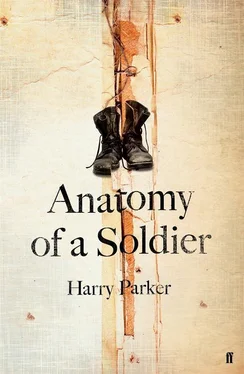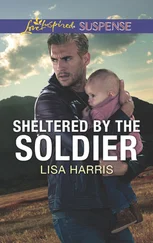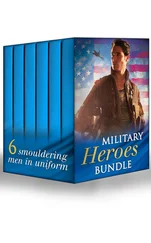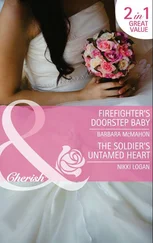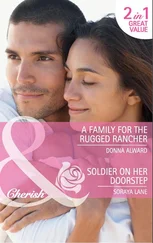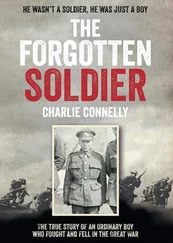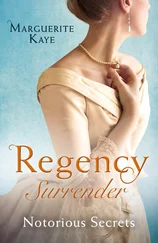The soldiers left the camp in their armour and helmets and holding their weapons. They walked into the tree lines and blocks of houses. Most days the popping of gunfire hung over the landscape and sometimes it sprayed over me and tore out to dissolve in the desert behind.
One week after Kushan Hhan pushed my pole into the ground and led them away from the fresh piles of rock back to the village, after the sun had risen behind me and cast my long thin shadow over the graves, a dark line of soldiers were returning to the camp, crossing the fields and passing down the sides of buildings, tiny at first — a line of insects — moving over a crossroads and through the abandoned ruins below me.
They filed out over the last open field before their camp and the lead figure disappeared in a puff of brown and then a loud bang broke over the hill. When the small cloud had drifted away there was a horizontal shape on the ground and the other soldiers came up and crouched around it.
A heavy vehicle revved out of the camp on the road and waited by the field as the soldiers carried a stretcher and loaded it on. Soon after a helicopter flared into the camp and the downdraught curled up dust. The vehicle returned to the camp and then the helicopter lifted above the walls and ducked its nose away across the desert behind me.
For days it was quiet and then cracks clipped across the fields. Sometimes they were hidden in the haze and the world seemed peaceful apart from the noise clattering in the distance.
It happened again while I was planted there. A crossroads or field would erupt in a smudge out in the flat landscape and helicopters landed and there was fighting.
It rained and became cold and the battles were less frequent. The harvest came and the colourful crops were cut away and the fields were bare again. Fighting returned with the heat and I flogged on my pole and frayed while the soldiers patrolled the countryside. But slowly the fighting was pushed farther away into the haze.
During the next summer, people returned to the ruins below me and started rebuilding the walls. They planted the field by the road and it burst into colour before the following harvest.
*
After the soldiers had departed in long convoys of lorries and containers and the sound of the last helicopter had trembled in my pole, the sporadic fighting moved away.
Finally, in one violent storm, when the desert wind stripped through me and I slapped in the wind, I ripped free and tumbled down the hill across the sand and caught on a rock. I stayed there, weighed down by gathering sand, and I rotted to join the dust.
The thick green canopy rolled above me, reflecting on the rear window. You were in the front, driving and humming along with the radio. Then you stopped the car and opened the boot.
You sat on the tailgate next to me and drank from a bottle of water. In the park people were walking their dogs through the shafts of light and down to the pond that suspended a morning fog. Pulling down the silicone sleeves and removing your legs, you noticed the ring on your finger and smiled as you thought of her. Then you reached for me and my pair and pulled us on, tightening the Velcro straps before dropping the boot lid shut and locking the car.
You shuffled from side to side on me, trying to keep balanced on my spongy carbon-fibre blade as you stretched your arms across your chest and then up behind your back.
I only touch the ground at one point. I curve up in a sweep to a running knee that attaches to the socket your stump was in. You started bouncing up and down as you warmed up your muscles and remembered the feel of me. I flexed below you as you moved from one of us to the other and we sprang back and you felt our energy and lightness.
Then you flicked me out in front and tottered across the car park to the road beneath the avenue of trees that circled the park. You walked us up onto the smooth tarmac and started to run, pushing down through us, gaining height, and then you leant forward to turn the height into forward motion. And I compressed under you and sprang on, clicking with each step, whipping over the tarmac and down, bounce and on.
We were running and I felt light underneath you as I pounded into the hard surface. Your hands were open and pumping next to you as you concentrated on balancing. I flashed underneath as you passed the walkers and the bicycles and ran on through the park, free of the weight of your other legs.
Each impact hurt your stumps but you were used to it and worked your limbs back and forward through it. You could feel the wind around you and breathed deeply as your heart pumped in your chest and down through your stumps. I compressed and sprang on below you and you puffed in and out above. We overtook another runner.
We did this twice a week; we were part of the park now. Nobody cared any more or stopped you to tell you how amazing I was or ask how it felt. It felt normal and light and fast and free — and you were running.
You paused at the bandstand and shuffled around with your hands on your hips as your breath condensed in the morning air. You looked at your watch and then I was bouncing you forward again. A dog chased after a ball on the playing fields and then another barked alongside me at my strangeness but you ran on and told the owner not to worry.
The low sun shone solid through the trees into your eyes and you accelerated, lengthening your stride, and could feel the sweat in your liners and the pounding, clicking, flashing of me below you. We were in full flight, at the edge of balance and control, and you pushed yourself faster still: as fast as you could, as you did every time.
And the car was just there and your breathing was ragged and your heart pounded and I pounded, and there was the stitch in your shoulder blade.
The rubber pad at the end of me caught on the road. There was no way of controlling me and I was suddenly folding up under you and your hands were out in front, stopping us on the road. And I was pulling away from your stump with the liner that shifted in your sweat as you fell around me and I sheered to an unnatural angle.
They came running over, shocked at the speed of your sudden collapse and the cracking noise I made on the tarmac. They came with their dogs or the squeal of bike brakes. They asked if you were okay and you pushed yourself over and sat in the middle of the road, at the centre of the crowd of help bending over you. They were surprised when you smiled and told them not to worry. They said your leg was broken, pointing at me bent behind you. You adjusted me and said that luckily I wasn’t real.
It did hurt but you didn’t want them to know. When someone offered to call an ambulance you laughed and said there was no need. Another pointed at your hands and you noticed that the palms were bleeding. They asked if you needed to be carried anywhere but you nodded at the car and said you’d be fine.
They drifted away once you’d convinced them that you were all right. You removed me, adjusted me back on and then limped to the car and sat in the boot, catching your breath and thinking how unpleasant a sudden fall like that was.
You looked at the deep red grooves down your palms and the black grit pushed under your skin. It stung and hardened into pain as you stared at them, but then you smiled and started to laugh at the pain and the blood that dripped from your hands. And tears came because you could, and it didn’t matter any more. It was normal.
You replaced me with your other legs, shut the boot and drove to work.
Lee Brackstone for understanding this book, his sound advice and making the whole process a pleasure. Gary Fisketjon for his time, experience and keen eye. Thank you both for making this a better book. Gillon Aitken for taking me on and Matthew Hamilton, my agent, for guiding me through it all. Everyone involved at Faber for their enthusiasm and love of books: Ruth Atkins, Lisa Baker, Luke Bird, Lizzie Bishop, Angus Cargill, Catherine Daly, Walter Donohue, Hannah Griffiths, Katie Hall, Matt Haslum, Kate McQuaid, Anne Owen, Eleanor Rees, Alex Russell — there will be some I have missed. For encouragement, help and early reads: Nick Bridle, Catherine Goodman, Jamie Jackson, Graeme Lamb, David McLoughlin, Tom Mangnall, Andy Michael, Edna O’Brien, Ed Parker, Sam Parker, Orlando Roberts, Harry Whelan. And Caro, who has been there during all of it.
Читать дальше
